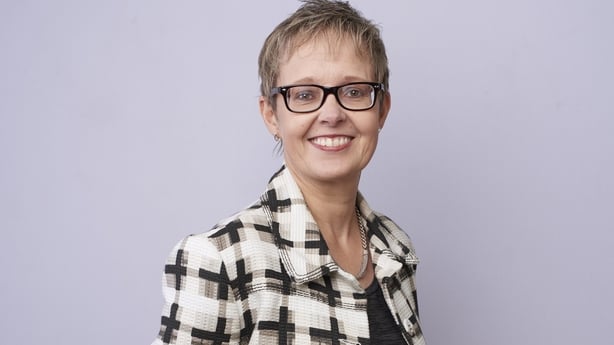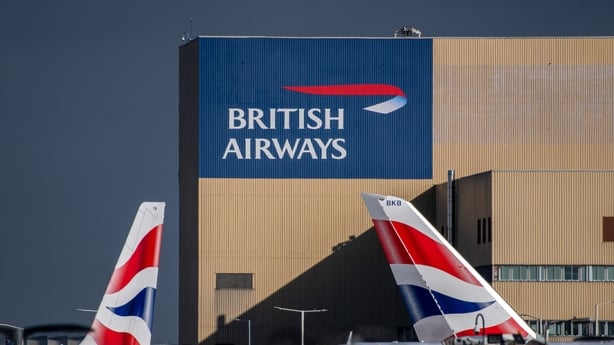Aer Lingus has reported operating profits of €139m for the third quarter of 2024, down €57m from the same time last year.
The airline posted operating profits of €148m for the nine months to the end of September, down from €236m the same time last year as its results were impacted by the summer industrial action by pilots at the airline and by market pressures - particularly across the Atlantic.
Aer Lingus said the industrial action had a direct impact of €55m over the second and third quarters with an additional impact on forward bookings.
It also noted that competitors across the Atlantic increased their capacity into Ireland by 20% this summer, putting pressure on its long-haul revenues, particularly in the economy cabin.
But it added that the third quarter also saw an underlying strong demand for major sun destinations and European city destinations.
In a statement today, Aer Lingus said it welcomed the recent decision of the High Court to grant a stay on the IAA's earlier decisions to reduce capacity by removing historic slots at Dublin Airport, adding that it welcomes the 5% seat reduction that had been proposed by the IAA for Summer 2025 will not now apply.
In the context of the competitive and cost environment and the uncertainty caused by the passenger cap, Aer Lingus has developed its network plan for 2025.
It said this will see an expected six Airbus 321 XLR aircraft joining the fleet over 2024/ 2025 and some reduction in A330 and A320 flying.
The confirmation of the new planes joining the fleet has seen Aer Lingus announce new routes to Nashville and Indianapolis recently, with the new routes due to start in April and May 2025 respectively.
Aer Lingus CEO says Dublin Airport passenger cap needs to be resolved
The chief executive of Aer Lingus has said the stay granted by the High Court on a plan by the aviation regulator to cut slot capacity at Dublin Airport next summer in order to ensure it complies with its passenger cap was a really important step.
Lynne Embleton said the decision does highlight the point that the airline thinks the passenger cap at the airport conflicted with slot regulations.
"But the next thing to say is that's only one step in the process," she said.
"We've still got the December legal hearing ahead, and quite possibly a long road ahead in terms of getting this issue finally resolved, which it does need to be."

She said the question now is whether the courts will give a quick answer on the matter or does the case get referred to the European courts.
"So whilst it doesn't impose the cap for next summer, I think we've still got uncertainty for the seasons beyond that and that is certainly in my mind, as I'm thinking about growth," the airline boss stated.
She said it was too early to say at this point what the impact would be on the winter of next year.
"There is of course not only the legal route here, but there's also the planning application that the daa has made to formally have the cap lifted," she said.
"And it's my hope that the process the planning process can catch up and that we'll get a permanent and positive resolution to this issue and hopefully next year," the Aer Lingus CEO said.
She added that most important thing about last Monday's ruling was that the airline does not have to reduce its capacity next summer by 5%.
"We haven't actually planned on that in our schedule," she said.
"We hadn't put growth in the schedule, but equally we hadn't taken that 5% out because we were optimistic that there would be a stay of some on that imposition," she explained.
"So now when I look at where we're very late in the planning process, I do see some opportunities around the edges," she said.
"We can improve timings, we're bringing the XLR's in, six of them, so that's a lot of capacity. So we're going to moderate that capacity by taking some reductions elsewhere," she added.
She said the airline's planning and scheduling decisions for next year were a combination of three factors including profitability, competition and the passenger cap.
"So we've had some good news on the latter. We're still working around all three and we're just finalising that and working through that because this is all quite last minute," she claimed.
She said Aer Lingus is planning a "reset" in 2025 and she is confident that it can be built back up to the margins that the parent IAG group needs.
But she added that she doesn't see any broad cross Aer Lingus redundancy programme, and added if there is any impact on staffing it will be at local level.
Ms Embleton said the impact of the 20% increase in North Atlantic capacity played a fairly major part in the summer results.
"It was a difficult environment, that amount of capacity coming into a market in one go was always going to cause a little bit of disruption to the normal commercial setup and that's what we saw in the summer," she said.
"It's unusual to get a spike like that, I'm expecting that to moderate and that the supply demand balance will become more normal and that the market will go into that extra capacity over time," she added.
Regarding the outcome of the US Presidential election, Ms Embleton said she does not see it as being either positive or negative for Aer Lingus.
In relation to the Irish general election, she said expressed hope that the new Government will look seriously at the passenger cap, as it does damage the economy and does need to be resolved.
She added that she was hoping to see support from the next Government around how to get Sustainable Aviation Fuel established as an industry here.
IAG quarterly operating profits up 15%

Aer Lingus owner IAG's quarterly operating profit jumped 15%, beating forecasts, and expressing optimism about future travel demand, as its growing exposure to lucrative transatlantic routes helped it outperform rival airlines.
Shares in IAG were up about 7% today to reach levels last seen in March 2020, before the pandemic halted travel. The stock is up 50% so far this year.
IAG, which also owns British Airways, Iberia and Vueling, said planes flying between London and the US were fuller this year compared to last and it had added capacity of 4% on the North Atlantic, while also flying more on the South Atlantic.
"Demand remains strong across our airlines and we expect a good final quarter of 2024 financially," chief executive Luis Gallego said.
IAG today also announced a €350m share buyback.
Higher ticket prices and lower fuel prices plus the group's focus on costs and efficiencies helped offset a higher wage bill and deliver the consensus-beating quarterly result.
IAG's performance contrasts with Air France-KLM and German group Lufthansa, both of which struggled over the summer with higher costs.
Air France yesterday reported a bigger-than-expected drop in its quarterly profit and warned that costs would come in higher than previously forecast, while Lufthansa last week reported a 9% drop in quarterly profit on rising costs and aircraft delivery delays.
"IAG continues to shine as one of the highest-quality airlines in Europe," Bernstein analysts said.
Compared to its European competitors, IAG is less exposed to Asian routes, where Chinese carriers have an advantage as they are still able to fly over Russian airspace, making their flights shorter and cheaper.
"It's not right now a priority for us to have capacity in Asia. We're trying to reinforce our main markets, North Atlantic, South Atlantic and intra-Europe," Gallego told reporters.
For the three months to end-September, its busiest season, IAG posted operating profit of €2 billion, compared to a consensus forecast of €1.78 billion.
Analysts are expecting full-year operating profits of €3.7 billion, compared to the €3.5 billion it made last year.

